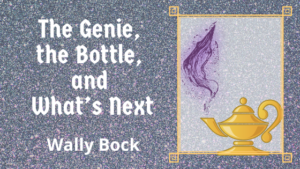One of the best things I've seen on the Internet.
Commentary by management consultant Michael Wade on Leadership, Ethics, Management, and Life
Thursday, April 30, 2020
Father and Son Talk Finance
One of the best things I've seen on the Internet.
There's Always a System

Outsiders who talk about getting rid of an "inner circle" may have a good point about the need to expand the flow of information and the number of participants. What is missed is that when it comes to large organizations, there is always an inner circle. And the replacements might not be that much better and, indeed, may be much worse.
[You want to get rid of Louis XVI's inner circle? Meet Robespierre and Marat.]
The same type of talk is heard about systems. People don't like bureaucracy because they don't care for red tape and inefficiency. The diagnosis should consider, however, that even a choice of no system creates a system. The question, as always, is simple: How does it operate?
It can be fun to discuss personalities but my advice is to look for the system.
[Photo by Louis Paulin at Unsplash]
The Man on the Sleigh
See the man on the sleigh, bringing the sap back to the shed to boil? He knows the tree like a brother. He knows the woods like a mother. He knows fire like a caveman. He knows commerce like a loanshark. He knows cold like a wintertime gravedigger. He knows sap like you know the alphabet. But he doesn't have the slightest idea what you're about, because you labor in a vineyard far removed from his. A place where the meaning of your efforts is likely always obscure, as all intellectual pursuits must be.
Read the rest at Sippican Cottage.
Read the rest at Sippican Cottage.
"To Take Care of Others, Start By Taking Care of Yourself"
The Man Who Never Sleeps

Every day - often more than once - I visit the blog of Nicholas Bate: prolific author and international consultant, for concise and practical wisdom.
[Photo by Sidharth Bhatia at Unsplash]
Wednesday, April 29, 2020
Books on 7th Avenue
My favorite used bookstore in Phoenix.
And it has an original name.
Family-owned. Not part of a chain. Great selection. Well-organized.
They are currently closed due to the coronavirus restrictions but are taking orders and mailing out books.
My family has been doing its best to provide business to local restaurants. I'm expanding my focus to the local used bookstore.
And supporting your local bookstore allows you to do a good deed while facilitating your book addiction.
On Page 49
"Wait a minute. I was told about the problem?"
"Yes."
"When was that?"
"The quarterly report. Not this quarter but a couple of quarters ago. If you check, you'll find that on page 49 there was mention of the potential problem."
"There always are mentions of lots of problems. Was a special meeting called? Was a specific warning memo sent?"
"No, but the possibility was mentioned."
"The possibility. On page 49."
"Yes."
"Yes."
"When was that?"
"The quarterly report. Not this quarter but a couple of quarters ago. If you check, you'll find that on page 49 there was mention of the potential problem."
"There always are mentions of lots of problems. Was a special meeting called? Was a specific warning memo sent?"
"No, but the possibility was mentioned."
"The possibility. On page 49."
"Yes."
The Best Motivation

As a leader, if you want to motivate people, there are many ways and the effectiveness of each can vary depending upon the person or the group.
The approach I recommend most is simple: Give them a meaningful goal, enable them to achieve it, and tell them how they are doing.
Achievement can be powerful but it is not necessarily addictive. It must be frequently renewed and nourished with candor. Don't assume that the obvious will remain obvious.
Like a ship captain, periodically check to ensure that winds have not altered the course. Frequently emphasize the mission.
This is not magic, but it can produce a certain magic.
[Photo by Sebastiano Piazzi at Unsplash]
Cyclical?
We know a pandemic has occurred every 10-50 years for the past few centuries, and the last one was in 1968, so we're overdue one.
- Science journalist Gaia Vince in 2013 [quoted in Shall We Wake the President?: Two Centuries of Disaster Management from the Oval Office by Tevi Troy]
- Science journalist Gaia Vince in 2013 [quoted in Shall We Wake the President?: Two Centuries of Disaster Management from the Oval Office by Tevi Troy]
A Blow for Economic Liberty
The Atlantic: Paul Sherman on the reduction of state licensing requirements and how it may continue after the pandemic.
Tuesday, April 28, 2020
A Good Thing to Remember
As Lenin made amply clear, Communists have only contempt for the "bourgeois" idea of objective truth, replacing it with a morality that holds "truth" to be whatever is expedient for the party at the moment.
- William McGurn
- William McGurn
Miscellaneous and Fast
- Gamer decor: Atari Pong Table.
- The New Republic: Joe Biden's pick as vice president.
- City Journal: Germany's Covid-19 story.
- Brian Tannebaum: Cancel the bar exam.
- Mother Earth News: Raising guinea fowl.
- Fast Company: Moving physical events to digital.
Keep in Mind
For the growing good of the world is partly dependent on unhistoric acts; and that things are not so ill with you and me as they might have been is half owing to the number who lived faithfully a hidden life, and rest in unvisited tombs.
- George Eliot
- George Eliot
The Results of Coronavirus Testing in Four U.S. Prisons
They started with the Marion Correctional Institution, which houses 2,500 prisoners in north central Ohio, many of them older with pre-existing health conditions. After testing 2,300 inmates for the coronavirus, they were shocked. Of the 2,028 who tested positive, close to 95% had no symptoms.
Read the rest of the Reuters report here.
Read the rest of the Reuters report here.
Find Your Style

[Photo by Filipe Almeide at Unsplash]
Discovery

There are those who tell you how smart they are and those who let you discover it. One approach is far more effective.
[Photo by Ben White at Unsplash]
Monday, April 27, 2020
No Orange Julius?
The Mind Circle: How America's shopping malls looked in 1989.
Excerpt
Although capitalism and global trade were making population a less and less important geopolitical factor, it is worth noting that the world's most populous countries in 1901 were China, with 350 million, British India with 294 million, Russia with 146 million, the United States with 75.9 million, Germany with 56.3 million, France with 38.9 million, Italy with 32.4 million and Austria with 26.1 million. A glance at the United States' key population and steel production figures show her already burgeoning power during this period. In 1880 there were around fifty million Americans, in 1901 nearly seventy-six and by 1905 no fewer than eighty-four. Meanwhile, in 1880 the US produced 3.84 million tons of steel (against Britain's 7.75 million and Germany's 2.69 million), whereas by 1900 the figures were 13.8 million, 9.0 million and 8.4 million respectively. The biggest leap came in 1907, when America's 25.8 million tons comprised more than Britain's 9.9 million and Germany's 12.7 million combined. Coal production figures for 1901 similarly mirror these other indicators of relative economic power, with the US producing 268 million tons, against Britain's 219 million and Germany's 112 million. It was calculated that at around the turn of the century, the United States could buy all the assets of Great Britain outright, with still enough left over to settle her national debt too. Into this promising situation, with a determination to translate America's wealth into power, stepped the protean genius of Theodore Roosevelt.
- From A History of the English-Speaking Peoples Since 1900 by Andrew Roberts
- From A History of the English-Speaking Peoples Since 1900 by Andrew Roberts
Direction and Basics

Aside from setting direction, the key focus of any leader should be the relentless review and execution of the basics.
All else is secondary.
[Photo by Ibrahim Boran at Unsplash]
Something to Consider

If an opponent repeatedly makes a mistake, consider the possibility that it is not a mistake but a strategy.
[Photo by David Clode at Unsplash]
Sunday, April 26, 2020
Panic-Buying in North Korea?
Ed Driscoll at Instapundit evaluates the unusual event.
Looking Back. Looking Forward.
Check out this George Will column on China [which was written in October 2019] and consider how the situation may stand today.
Curling Up
Today I will be curling up with a book on the plague.
It is a short book and may lift the spirits since the times we are in look like a trip to Disneyland compared to those dark days.
There are many advantages to studying history and a major one is it provides perspective. If you know what happened before then the "here and now" is usually not that bad.
I'm also determined to learn more about Lord Salisbury but that's another subject.
Have a great day. Stay healthy and don't be afraid.
We'll get through this sooner than many expect.
Find Something Beautiful Today

[Photo by Andy Holmes at Unsplash]
Saturday, April 25, 2020
Stoicisim in a Time of Pandemic

From The Guardian: Time to get out the Seneca, Epictetus, and Marcus Aurelius and go full Stoic.
[Photo by Juliana Malta at Unsplash]
Five to Read
Bruce Boucher of the Sir John Soane's Museum in London (one of my favorite museums) has listed five books to read during lockdown.
An excerpt:
Burckhardt entertained the idea of writing a second volume, explaining the art of the Renaissance against its historical background, but he abandoned the project as he could not integrate the two subjects to his own satisfaction. Still, he had the remarkable ability to project himself into historical and artistic subjects and illuminate them as, for example, the story of a condottiere who saved a city-state like Siena from foreign aggression. When the citizens debated how to reward him, they felt that no reward was great enough, not even to be made lord of their city. Finally, a member of the council said, “Let us kill him and worship him as our patron saint,” which they did. The vignette illustrates the immorality of political conduct in the Renaissance, which gave birth to a more pragmatic, secular world. Burckhardt’s Italo-centric approach to the Renaissance has often been challenged; yet it is still essential reading for an understanding of origins of the modern Western world.
An excerpt:
Burckhardt entertained the idea of writing a second volume, explaining the art of the Renaissance against its historical background, but he abandoned the project as he could not integrate the two subjects to his own satisfaction. Still, he had the remarkable ability to project himself into historical and artistic subjects and illuminate them as, for example, the story of a condottiere who saved a city-state like Siena from foreign aggression. When the citizens debated how to reward him, they felt that no reward was great enough, not even to be made lord of their city. Finally, a member of the council said, “Let us kill him and worship him as our patron saint,” which they did. The vignette illustrates the immorality of political conduct in the Renaissance, which gave birth to a more pragmatic, secular world. Burckhardt’s Italo-centric approach to the Renaissance has often been challenged; yet it is still essential reading for an understanding of origins of the modern Western world.
Excerpt
Halifax - whose nickname for Churchill was "Pooh," after the A. A. Milne character Winnie-the-Pooh - grumbled that Churchill's new cabinet appointees lacked intellectual heft. Halifax likened them all to "gangsters," the chief gangster, in his view, being Churchill. "I have seldom met anyone with stranger gaps of knowledge, or whose mind worked in greater jerks," Halifax wrote in his diary that Saturday. "Will it be possible to make it work in orderly fashion? On this much depends."
- From The Splendid and the Vile: A Saga of Churchill, Family, and Defiance During The Blitz by Erik Larson
- From The Splendid and the Vile: A Saga of Churchill, Family, and Defiance During The Blitz by Erik Larson
First Paragraph
Historians and doctors have much in common. Both acknowledge that the proper study of mankind is Man. Both are particularly interested in the influences which condition human existence. The object of this book is to study the area in which doctor and historian inevitably meet, that of the impact of disease upon history. In medical diagnosis, a single cause for disease will likely be found. In historical investigations, the causes are likely to be complex. Nothing could be more ridiculous than to contend that disease is always the primary cause of a great historical change; but, particularly at a time when the sociological aspects of history are being emphasized, it is worth examining those episodes in which the influence of disease may have been of real importance, especially when that importance has been neglected or misconstrued by more conventional historians.
- From Disease and History by Frederick F. Cartwright in collaboration with Michael D. Biddiss
- From Disease and History by Frederick F. Cartwright in collaboration with Michael D. Biddiss
Friday, April 24, 2020
Zoomed Out?
FutureLawyer - techie, poet, beach denizen, and attorney - is a natural Zoomie.
It is not surprising that he has some observations on Zoom fatigue.
I haven't used Zoom that much and I already have it.
The Blogger's Rule
Excellent post by Kurt Harden at Cultural Offering on how bloggers often follow a rule of tolerance.
I read blogs that I thoroughly enjoy while knowing that the person doesn't necessarily share my own political and philosophical views.
A side note: I've occasionally gotten criticism from readers who are shocked that I can be so astute in some areas and yet so dense in others.
And that always causes me to wonder: "Why should I be different from anyone else?"
I read blogs that I thoroughly enjoy while knowing that the person doesn't necessarily share my own political and philosophical views.
A side note: I've occasionally gotten criticism from readers who are shocked that I can be so astute in some areas and yet so dense in others.
And that always causes me to wonder: "Why should I be different from anyone else?"
Coronavirus Consensus?
Michael Barone with good points in the Washington Examiner.
"The Culture of Corona"
The New Criterion on the danger of epidemic panic:
"We suspect that more deadly than what the coronavirus might do to us is what we might be doing to ourselves."
"We suspect that more deadly than what the coronavirus might do to us is what we might be doing to ourselves."
Lockdown Zealotry
A sure sign of fanaticism is the inability to make distinctions, in this instance between risky and non-risky activities and between places hard hit and places not. It’s one thing to hold a day-long, 100-person family reunion in a public park, quite another to jog through one. It’s one thing to begin opening up in New York City, where there have been more than 10,000 deaths, and another to begin opening in Montana, where there have been 14.
Read the rest of Rich Lowry in National Review.
Read the rest of Rich Lowry in National Review.
3 a.m.
I was up at 3 a.m.. Couldn't sleep and so decided to get up and work instead of thrashing about in bed.
Drafted some material, had a very early breakfast, and talked to the dog when she wandered in to see what I was doing.
Eventually I fell back to sleep on the living room sofa until the dog returned to remind me that it was time for her breakfast.
My wife slept through all of this: a testament to my cat-burglar skills which, I should note, stand in contrast to the subtle jack-hammer style she adopts whenever she is up earlier.
Later I will see if the draft makes sense but I believe it will.
There are occasions when 3 a.m. is just the right time for insight.
Drafted some material, had a very early breakfast, and talked to the dog when she wandered in to see what I was doing.
Eventually I fell back to sleep on the living room sofa until the dog returned to remind me that it was time for her breakfast.
My wife slept through all of this: a testament to my cat-burglar skills which, I should note, stand in contrast to the subtle jack-hammer style she adopts whenever she is up earlier.
Later I will see if the draft makes sense but I believe it will.
There are occasions when 3 a.m. is just the right time for insight.
First Paragraph
The Black Death of 1348 and 1349, and the recurrent epidemics of the fourteenth and fifteenth centuries, were the most devastating natural disasters ever to strike Europe. We cannot cite exact losses; there are no global figures. The populations of some cities and villages, in areas as far removed from each other as England and Italy, fell in the late decades of the fourteenth century by 70 or 80 percent. The more we learn of the late medieval collapse in human numbers, the more awesome it appears. Europe about 1420 could have counted barely more than a third of the people it contained one hundred years before.
- From The Black Death and the Transformation of the West by David Herlihy
- From The Black Death and the Transformation of the West by David Herlihy
Find Your Style

[Photo by Joshua Rawson-Harris at Unsplash]
Thursday, April 23, 2020
Good Questions

A few good questions to ask yourself when faced with a business proposal:
- "Am I inclined to say no?' [If you are then no is probably the right answer.]
- ""How would I feel if this opportunity went away?" [If "relieved" comes to mind then you know what your answer should be.]
- "What do I see on the horizon?" [Does it look like stormy weather? Say no.]
[Photo by Sergei Solo at Unsplash]
Honoring Lenin?

The National Union of Mineworkers needs to study Russian history. The idea that Lenin was some idealistic moderate is ridiculous.
An Irritating Management Book
As is my practice, I'm reading several books at once and one, a management book, is irritating me.
"Irritating" not because it is bad. Some parts are excellent and I'm making careful notes on those but then sloppy thinking intrudes. I wonder if the editor went on vacation or if the author had a tight deadline or whatever the hell was going through his mind when he'd repeat the sort of whacked-out reasoning you might encounter at a terrible neighborhood party after everyone has drained the punch bowl.
It reminds me of the very short poem by Longfellow.
"Irritating" not because it is bad. Some parts are excellent and I'm making careful notes on those but then sloppy thinking intrudes. I wonder if the editor went on vacation or if the author had a tight deadline or whatever the hell was going through his mind when he'd repeat the sort of whacked-out reasoning you might encounter at a terrible neighborhood party after everyone has drained the punch bowl.
It reminds me of the very short poem by Longfellow.
"If It Saves One Life"
Once the Coronavirus is subdued, will the attention of those who used the "if it saves one life" standard shift to a vigorous advocacy of 25 MPH speed limits on freeways?
Somehow I doubt it.
Wednesday, April 22, 2020
Of Your Peers
First Things: Peter Hitchens on the decline of the jury. An excerpt:
For without a jury, any trial is simply a process by which the state reassures itself that it has got the right man. A group of state employees, none of them especially distinguished, are asked to confirm the views of other state employees. With a jury, the government cannot know the outcome and must prove its case.
For without a jury, any trial is simply a process by which the state reassures itself that it has got the right man. A group of state employees, none of them especially distinguished, are asked to confirm the views of other state employees. With a jury, the government cannot know the outcome and must prove its case.
Wise
I've had a few arguments with people, but I never carry a grudge. You know why? While you're carrying a grudge, they're out dancing.
- Buddy Hackett
- Buddy Hackett
Focus

In those long-lost days of yore, when I was in front of a typewriter I could only do one thing: type.
I'm beginning to appreciate the benefits of some limitations.
[Photo by REVOLT at Unsplash]
Second Life
I just sent a note to a training broker about Second Life.
If they go that rather exotic route, my primary condition is I get to pick my own avatar.
If they go that rather exotic route, my primary condition is I get to pick my own avatar.
First Paragraph
Because of Friar John's confinement in the house in Verona, he was unable to deliver a message to Romeo at Mantua. The message explained that news of Juliet's death was false, for she had taken a potion to render her insensible for a time, to avoid marriage to Paris. His failure to deliver this information was crucial, for Romeo did indeed hear of her death and, unaware of the circumstances, returned in anguish to Verona. From that point the tragedy unfolded inexorably. Shakespeare's audiences would immediately have understood his device, for plague intermittently disrupted social and commercial intercourse, as it had been doing for almost 250 years.
- From The Great Plague by Stephen Porter
- From The Great Plague by Stephen Porter
Find Your Style

[Photo by Hannah Nicollet at Unsplash]
Tuesday, April 21, 2020
Coronavirus Test
It often takes years to create a viable antibody test as accurate as PCR-based testing. But in less than six weeks, biotech companies—approached by the U.S. government through the White House-created public-private partnership—have already seen their efforts bear fruit. This is a tribute to the incredible creative potential of the biotech sector, but it also shows the power of free enterprise, unshackled by government bureaucracy. It took more than America’s best scientists to rise to the occasion: it took a regulatory regime to let them do so.
Read all of Chris von Csefalvay's City Journal essay here.
Read all of Chris von Csefalvay's City Journal essay here.
Brainstorming During The Quarantine - continued
Earlier post here.
Another subject to discuss:
"Considering the way we operate, what do we need to discuss which we normally are too busy to discuss?"
Help Local Businesses

Cultural Offering isn't just right, he's damned right.
Now is a key time to help local businesses. If possible, do more than your usual share.
[Photo by Tim Mossholder at Unsplash]
Reasons

If they didn't do their homework, it's because they were eager to take action. If they were rude, then at least they were honest. If they didn't prevent the problem, it was because they were too busy putting out fires and besides, who has time to prevent things? If they ignored instructions, it was because of changed circumstances or perhaps they didn't get the order or they did but they told someone else to do it and if well, if you can't trust people to do things then what are we? Animals?
[Photo by Austin Ban at Unsplash]
First Paragraph
Granted: I'm an inmate in a mental institution; my keeper watches me, scarcely lets me out of sight, for there's a peephole in the door, and my keeper's eye is the shade of brown that can't see through blue-eyed types like me.
- From The Tin Drum by Gunter Grass
- From The Tin Drum by Gunter Grass
Monday, April 20, 2020
Awaken
Compared to what we ought to be, we are only half awake. We are making use of only a small part of our physical and mental resources. Stating the thing broadly, the human individual thus lives far within his limits. He possesses power of various sorts which he habitually fails to use.
- William James
Delayed Bar Exams
Instapundit (who is also a law professor) on whether law grads should get a temporary license to practice law.
Play Ball in 2020!
Political Calculations has a very interesting review of how Major League Baseball might get the game going again.
And those of us in Arizona are very interested.
Find Your Style

[Photo by Hardini Lestari at Unsplash]
Brainstorming During the Quarantine

Although many of us enjoy fewer meetings and interruptions, preferring instead to hunker down in our homes behind bolted doors and old pizza boxes, there are more extroverted souls who miss the banter and socializing of a normal workplace.
And the quarantine is driving them close to the edge.
As a result, it may help to offer periodic brainstorming sessions in which people are invited to weigh in on various work-related topics, especially ones which might be neglected in the current environment.
At the same time these can be sessions that may even please the extroverts.
Some possible topics:
- When things return to normal (or quasi-normal), which topics will require a significant amount of our time and attention?
- Is there any practice that we adopted during the quarantine that you hope is continued?
- What did we learn about internal and/or external customer needs that we might not have understood before the quarantine?
- In retrospect, if you could have changed our operating procedures during the quarantine, what would you have changed?
- What surprised you the most about working away from the office?
- If you've recently been watching TED talks or reading job-related articles, is there one you would label your favorite?
[Photo by Charles Deluvio at Unsplash]
The Unfinished
Talking about it, working on it, and thinking about it are nice but they are not the same as finishing it.
Unfinished projects have a habit of winking at us from underneath stacks of papers.
First Paragraph
The end of May 1940. Slowly advancing, side by side, Ferrante and his son Stefano were cutting the meadow. Behind them the small chestnut horse, tied to the cart, was waiting. It had already finished the entire pile of grass Stefano had put in front of it when they began their work. The horse had eaten eagerly, continually lifting and shaking its head to shrug off the bulky collar that was sliding along its neck. Now, without taking a step, it reached forth with its muzzle to tear off the leaves from the mulberry tree, where it had been left in the shade; it also tore at the bark of the more tender branches, which looked broken and white as tiny bones where the horse's teeth had left their mark.
- From The Red Horse by Eugenio Corti
- From The Red Horse by Eugenio Corti
Sunday, April 19, 2020
Productivity Reminder 62

Nicholas Bate continues with his series and addresses the Master List and more.
[Photo by Kelly Sikkema at Unsplash]
Door Sign for Our Times

[Photo by Scott Umstattd at Unsplash]
Back By Popular Demand: An Excerpt from the British Version of "The Office"
Let's face it: the British version of "The Office" is far superior to the American version.
Experience
"Experience is the worst teacher; it gives the test before presenting the lesson."
- Vernon Law
"Experience teaches only the teachable."
- Aldous Huxley
"Experience is a good teacher, but she sends in terrific bills."
- Minna Antrim
Find Something Beautiful Today

[Photo by Nagy Arnold at Unsplash]
Saturday, April 18, 2020
Today's Assignment

Do as little as possible today.
You'll be all the better for it.
[Photo by Inside Weather at Unsplash]
Warning

Once you pick it up, it is very hard to put it down.
Subscribe to:
Posts (Atom)


























